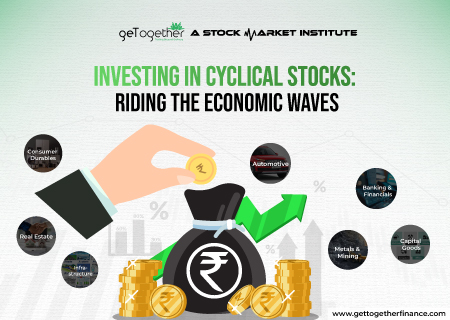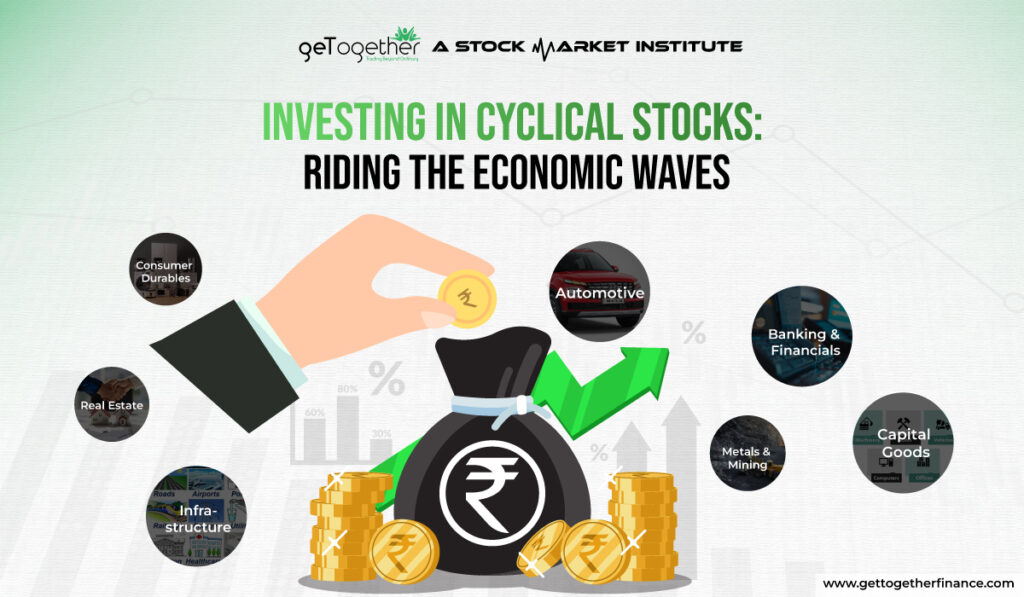Investing in Cyclical Stocks: Riding the Economic Waves


Cyclical stocks are those that dance to the rhythm of the economy. The fortune of these stocks rise and fall with the overall economic climate. Unlike defensive stocks, which remain relatively steady, cyclical stocks are more sensitive to economic ups and downs. These stocks represent companies that produce goods or services that consumers tend to buy more of during economic booms but cut back on during recessions. In this blog, we’ll explore these stocks, how they work, and the potential risks and rewards they offer investors.
Table of Contents
ToggleWhat Are Cyclical Stocks?

Cyclical stocks are shares of companies whose business performance and stock prices are closely tied to the economic cycle. These companies typically experience higher sales and profits during periods of economic growth and expansion, but they may suffer declines during economic downturns and recessions.
Companies with such stocks include car manufacturers, airlines, furniture retailers, clothing stores, hotels, and restaurants. When the economy is doing well, people can afford to buy new cars, upgrade their homes, shop, and travel. But when the economy drops, people often cut back the expense of these stocks as they may become worthless if there is no business.
Also Read: Fractional Shares
Characteristics of Cyclical Stocks
Here are a few traits that these stocks carry:
- Economic Sensitivity: These stocks are highly sensitive to changes in the economy and perform well when the economy is strong and struggle during economic slowdowns.
- Industries: Common industries with these stocks include automotive, housing, airlines, luxury goods, and entertainment. These sectors tend to flourish when consumers have more disposable income.
- Volatility: These stocks can be more volatile than non-cyclical (defensive, FMCG) stocks, with significant price fluctuations based on economic conditions.
How Cyclical Stocks Work?
Cyclical stocks are those whose performance closely mirrors the overall economic cycle. They tend to thrive during economic expansions but struggle during recessions.
Here’s the process breakdown of how they work:
- Economic Expansion: When the economy is booming, consumer spending increases. This leads to higher demand for goods and services produced by cyclical companies. Consequently, their revenues and profits rise, boosting their stock prices.
- Economic Contraction: During economic downturns, consumer spending drops. People prioritise essential goods and services, reducing demand for discretionary items produced by cyclical companies. This leads to lower revenues, profits, and stock prices.
Top Cyclical Stocks In India

Here is a cyclical stocks list that are leading in the market:
| Sector | Top Cyclical Stocks |
| Automotive | Mahindra & Mahindra (M&M), Maruti Suzuki India, Tata Motors, Bajaj Auto, Eicher Motors |
| Real Estate | DLF, Prestige Estates, Oberoi Realty, Godrej Properties |
| Banking & Financials | State Bank of India (SBI), ICICI Bank, Axis Bank, HDFC Bank |
| Capital Goods | Larsen & Toubro (L&T), Bharat Heavy Electricals (BHEL), Siemens India |
| Metals & Mining | Tata Steel, JSW Steel, Hindalco Industries, National Aluminium Company (NALCO) |
| Infrastructure | Larsen & Toubro (L&T), Hindustan Construction Company (HCC), IRB Infrastructure |
| Consumer Durables | Havells India, Crompton, Greaves, Consumer Electricals, Voltas |
| Hospitality | Indian Hotels Company, EIH (Oberoi Hotels), Lemon Tree Hotels |
Advantages and Disadvantages of Cyclical Stocks

Cyclical stocks are sorta the face of the economy and represent how the country is performing. Here are the benefits of these stocks:
- High growth potential: During economic expansions, these stocks can deliver exceptional returns as demand for their products and services surges.
- Easy to identify: These stocks are often associated with sectors that are directly linked to economic activity, making them relatively easy to identify.
- Potential for strong earnings: When the economy is booming, cyclical companies tend to report robust earnings growth.
With the rhythmic dance of the economy, there are a few setbacks that come with investing in these stocks:
- High volatility: These stocks are highly sensitive to economic fluctuations, leading to significant price swings.
- Increased risk: The potential for substantial losses during economic downturns is higher compared to defensive stocks.
- Timing the market: Successfully timing the purchase and sale of these stocks can be challenging, as predicting economic cycles is difficult.
- Lower dividend payouts: Cyclical companies often reinvest profits during expansionary periods, leading to lower dividend payouts compared to defensive stocks.
Cyclical and Non-Cyclical Stocks
Cyclical stocks and non-cyclical stocks behave very differently based on how the economy is doing. Cyclical stocks, like those of car makers or travel companies, do well when the economy is strong and people are spending a lot. But when the economy slows down, these stocks can take a big hit because people cut back on non-essential spending. Investors in these stocks try to buy when prices are low and sell when they’re high, which can be risky.
On the other hand, non-cyclical stocks, such as those of utility companies or healthcare providers, stay more stable regardless of economic ups and downs. These companies provide essential goods and services that people always need, so their stocks don’t fluctuate as much.
While non-cyclical stocks may not offer as much potential for big gains during economic booms, they are seen as safer investments because they tend to hold their value better during economic downturns. Deciding between both kinds of stock depends on how much risk you’re willing to take and your goals for investing.
Here is a brief table that simplifies the difference between both the stocks:
| Factor | Cyclical Stocks | Non-Cyclical Stocks |
| Economic Sensitivity | Highly sensitive to economic cycles | Less sensitive to economic cycles |
| Industries | Automobiles, airlines, luxury goods | Utilities, FMCG, healthcare, consumer staples |
| Performance | High during economic growth, low during downturns | Steady performance regardless of economy |
| Risk | Higher due to volatility | Lower due to stability |
| Investment Strategy | Buy low during downturns, sell high during peaks | Hold for steady, long-term gains |
| Examples | Car manufacturers, hotels, retail | Electric companies, food producers |
In A Nutshell
In essence, cyclical stocks denote companies whose performance is strongly linked to the economic cycle. While they can offer significant returns during periods of economic growth, they also carry higher risks during downturns. Understanding the economic cycle, staying informed about market conditions, and employing strategic timing are key to investing successfully in these stocks. By carefully considering these factors, investors can potentially enhance their portfolios with the growth opportunities presented by cyclical industries.
FAQs
How do cyclical stocks differ from defensive stocks?
Defensive stocks are less affected by economic cycles, while cyclical stocks are highly influenced by them.
Why does cyclical indicate?
Their earnings and stock prices tend to fluctuate in cycles, mirroring the economic cycle.
When is the best time to invest in cyclical stocks?
Cyclical stocks often perform well during economic upturns, but timing the market is difficult.
Are cyclical stocks better than defensive stocks?
It depends on your investment goals and risk tolerance. A balanced portfolio often includes both.
How do economic indicators affect cyclical stocks?
Economic indicators like GDP growth, inflation, and interest rates influence cyclical stock performance.
What are leading, lagging, and coincident economic indicators?
These are indicators that precede, follow, or coincide with economic cycles, respectively, and can be used to predict cyclical stock movements.
How to identify cyclical stocks?
Look for companies in sectors that are highly influenced by economic cycles, such as automobiles, steel, banking, and consumer durables. Their revenue and profits tend to fluctuate with economic conditions.
What are non-cyclical stocks?
Non-cyclical stocks, also known as defensive stocks, are those whose performance is less affected by economic cycles. They represent companies that provide essential goods or services, like FMCG, healthcare, and utilities.
What are examples of cyclical stocks?
A few examples of these stocks include companies in sectors like automobiles (Tata Motors), steel (JSW Steel), banking (HDFC Bank), and consumer durables (Maruti Suzuki).



 Facebook
Facebook Instagram
Instagram Youtube
Youtube
